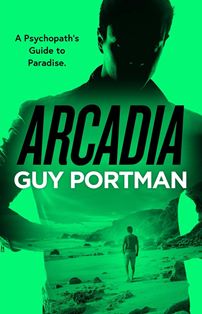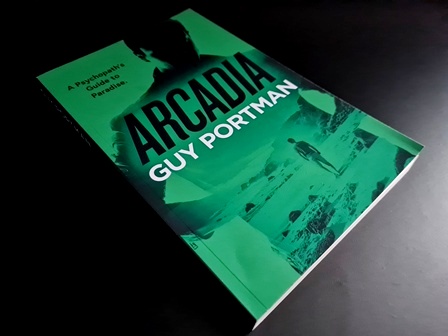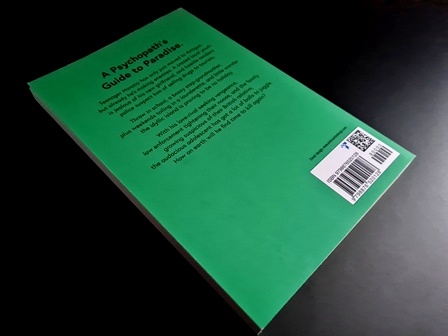
First published back in January of 2024, British author Guy Portman’s novel ‘Arcadia’ formed the second book in the ‘Emergence’ series featuring the young psychopath ‘Horatio’. The series is itself a spinoff from the author’s original ‘Necropolis’ trilogy, which followed the character of Dyson Devereux (Horatio’s father).
For the best reading experience, the ‘Emergence’ books should be read after those from the ‘Necropolis’ trilogy.
Following the utterly undignified death of her partner, Horatio Robinson’s mother decides they need a break from London and so she packs up their bags and the two of them fly off to the Caribbean island of Antigua, where her father lives.
Her plans are that they’ll live there with her father for a while. Probably a year or so. As such, with Horatio now being fifteen, he’ll need to enrol with the local school so as to continue his education.
The situation seems perfect. They’ll be living in a house right next door to Horatio’s grandfather and his eighteen-year-old cousin, Dougal. As such, upon arriving they find everything ready and set up for them.
Horatio finds life on the island to be pretty good. It’s not cold and raining all of the time like it is in the UK. Instead, in Antigua he finds life to be far more laid back, especially when compared to how hectic London was.
Although it’s not all beaches and bikinis for Horatio. Saturday’s, he has to work at his grandfather’s laundrette, as a contribution for his upkeep and an opportunity for him to learn about work.
However, in the nearby streets to the laundrette are the slums of Antigua. A place where drugs are rife. A broken community where hostility and jealousy simmer away, seemingly out of sight from the island’s thriving tourist population.
Unfortunately for Horatio, he’s attracted the attention of one of the nastier residents from these slums. An eighteen-year-old dreadlocked lout named Javel, who’s clearly jealous over the attention Horatio’s been getting from the island’s resident beauty – Dalilah.
Before long the situation has escalated, and Horatio has an enemy hellbent on reaping his revenge.
But what Javel isn’t expecting is quite how merciless and downright cunning Horatio is. He also didn’t expect to be up against a psychopathic killer. One who’s killed, and will no doubt kill again…
Following on almost immediately from where the first book in the trilogy – ‘Emergence’ (2023) – left off, this second instalment hits the ground running with a complete change in scenery and a fresh new start for Horatio to no doubt flourish within.
Having the entirety of the story set on the idyllic island of Antigua, the tale instantly feels fresh and distinctly different from the previous book. This absolutely works in its favour, allowing Horatio to adapt and evolve using his effortless charm.
What comes out the most from the novel is the gradual evolution of our antihero – Horatio. Here we start to see his psychopathic traits rising to the surface even more than before. His complete detachment from any human emotions is highlighted time and again. He shows zero empathy in any situation. Instead, we have a teenager who goes through life acting out such reactions. Being told what he should say, how he should act, what should come naturally in anyone.
Like with the previous book (and indeed those from the ‘Necropolis’ series), the story is told from the perspective of Horatio. As such, we’re exposed to his internal monologue which uncovers the darkest insight into the character. His thoughts and psychopathic ponderings are revealed. Of course, this is all delivered with the same quick-witted pitch-black comedy to its delivery, akin to that of ‘American Psycho’ (1991) or ‘Dexter’ (2006 – 2013).
Indeed, as with Bret Easton Ellis’ aforementioned classic, our psychotic antihero effortlessly projects the absolute epitome of intelligence and charisma. Through doing so he easily attracts the attention of the fairer sex. This added layer to the storyline brings with it a sort of ‘coming-of-age’ element, which when combined with the principal character’s lack of empathy, makes for an interesting development.
At times this coming-of-age angle can feel vaguely reminiscent to Salinger’s ‘The Catcher In The Rye’ (1951), very purposefully complicating the readers’ emotions. You find yourself rooting for the killer to an even greater degree. Affectionately, embracing the quirky traits of this psychopath who we also know to be devoid of any real emotion.
There’s so much to like about this novel, and with the new and different backdrop to it, the story feels inherently fresh and different to that of the previous instalment. That said, despite all the wackiness, and outrageously over-the-top escalation within the book, it nevertheless still feels like a bridging story. The middle book to a trilogy which doesn’t accomplish much other than the simple entertainment value of continuing a good story.
Although that’s a good enough mission for this reviewer at least. Quite simply a frigging damn good read.
The novel runs for a total of 179 pages.

© DLS Reviews
‘Necropolis’ instalments:
- ‘Necropolis’ (2014)
- ‘Sepultura’ (2018)
- ‘Golgotha’ (2019)
‘Emergence’ instalments:
- ‘Emergence’ (2023)
- ‘Arcadia’ (2024)
- ‘Cognizance’ (2024)








